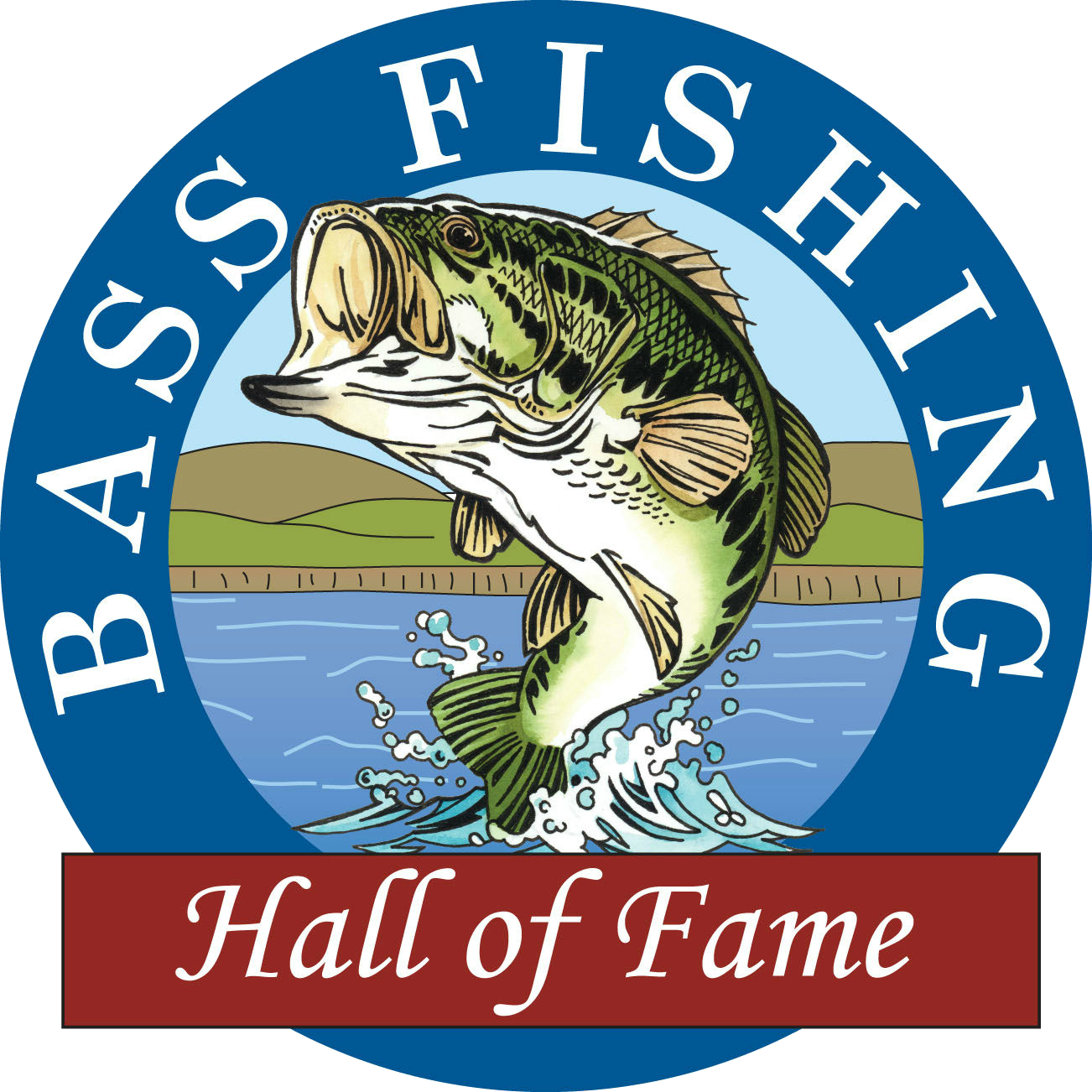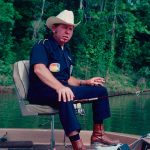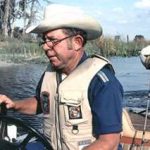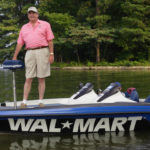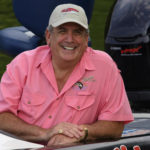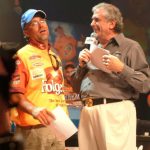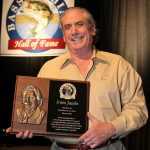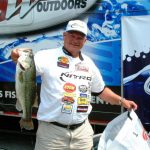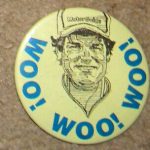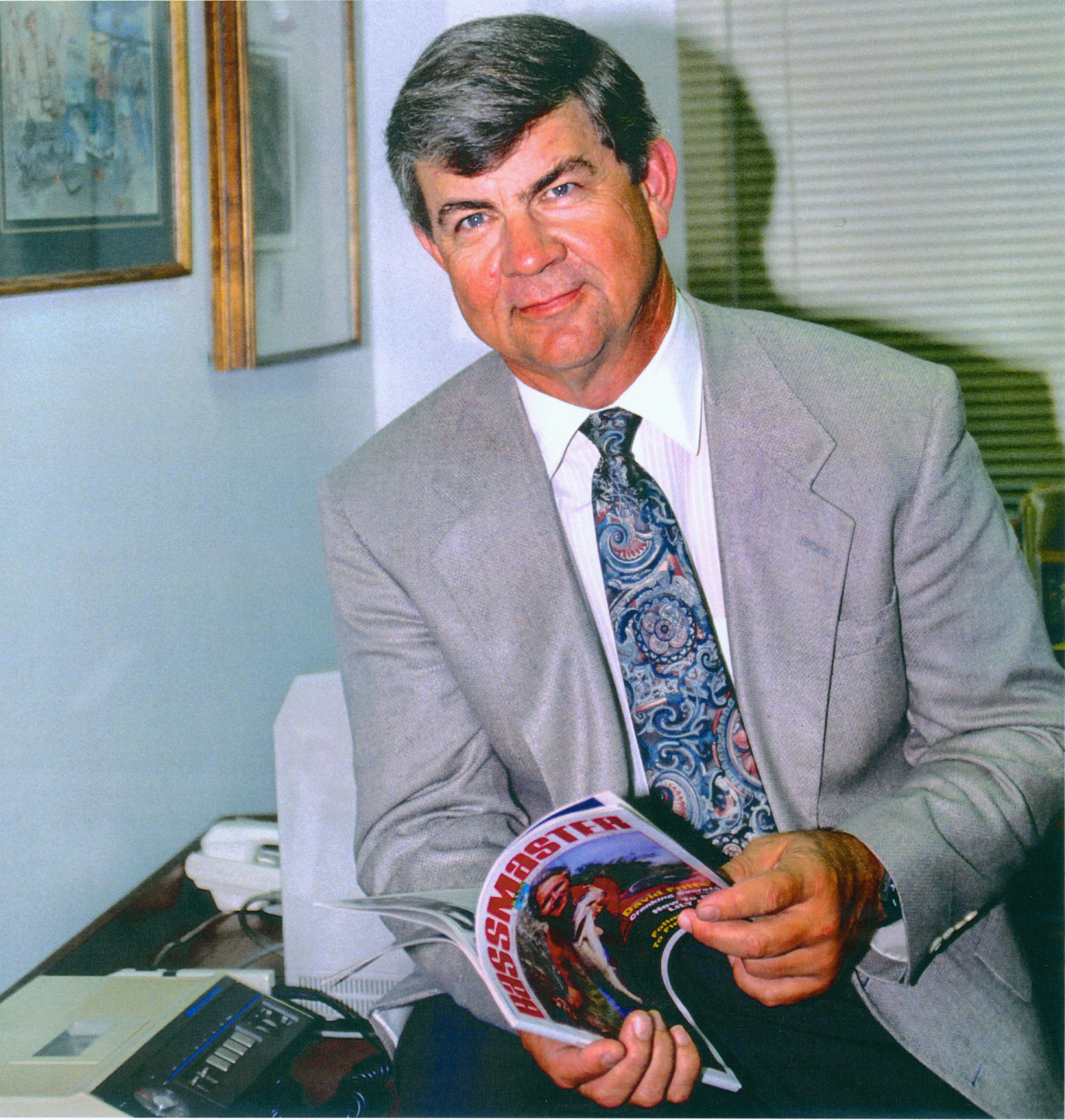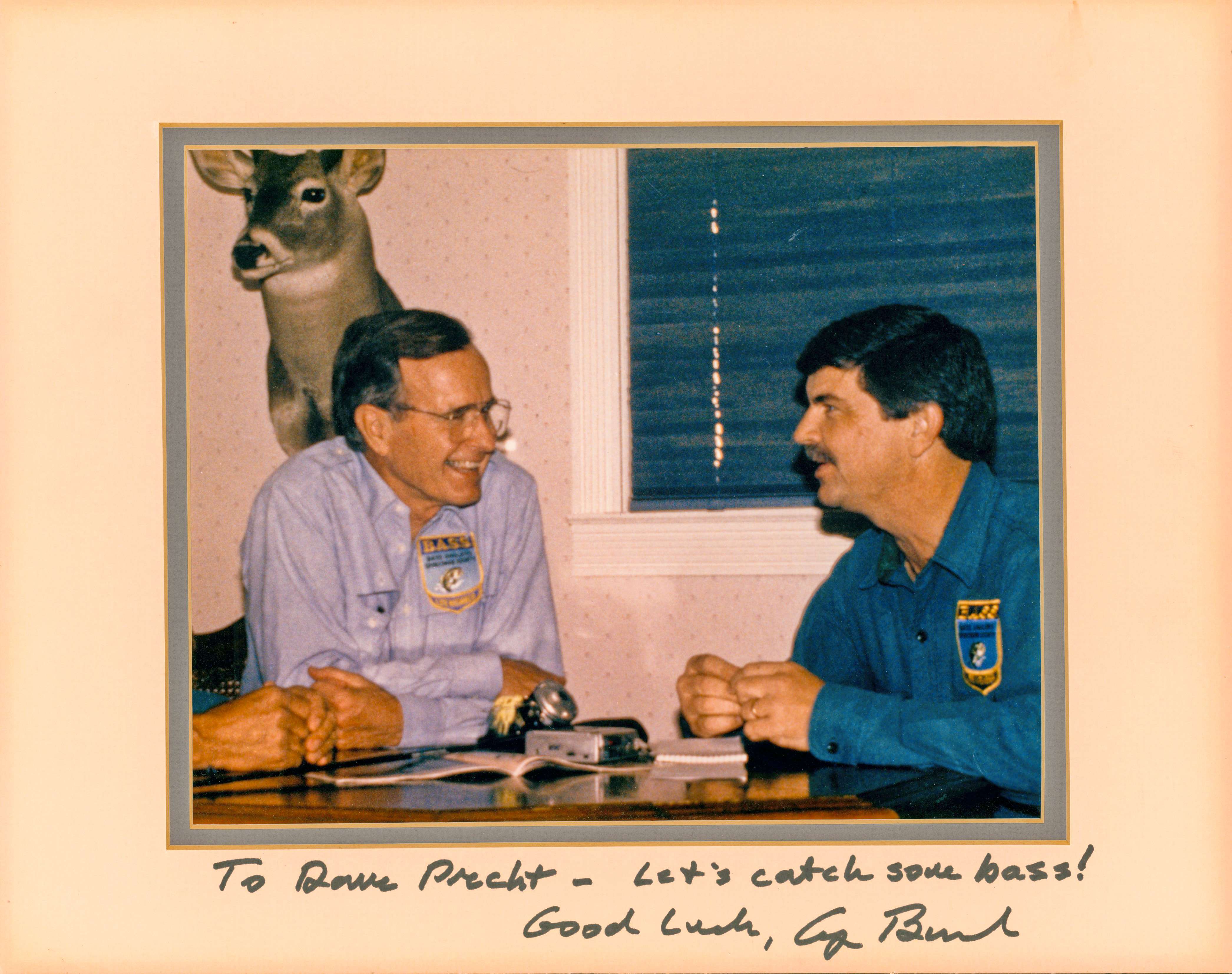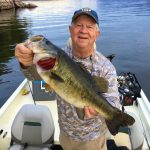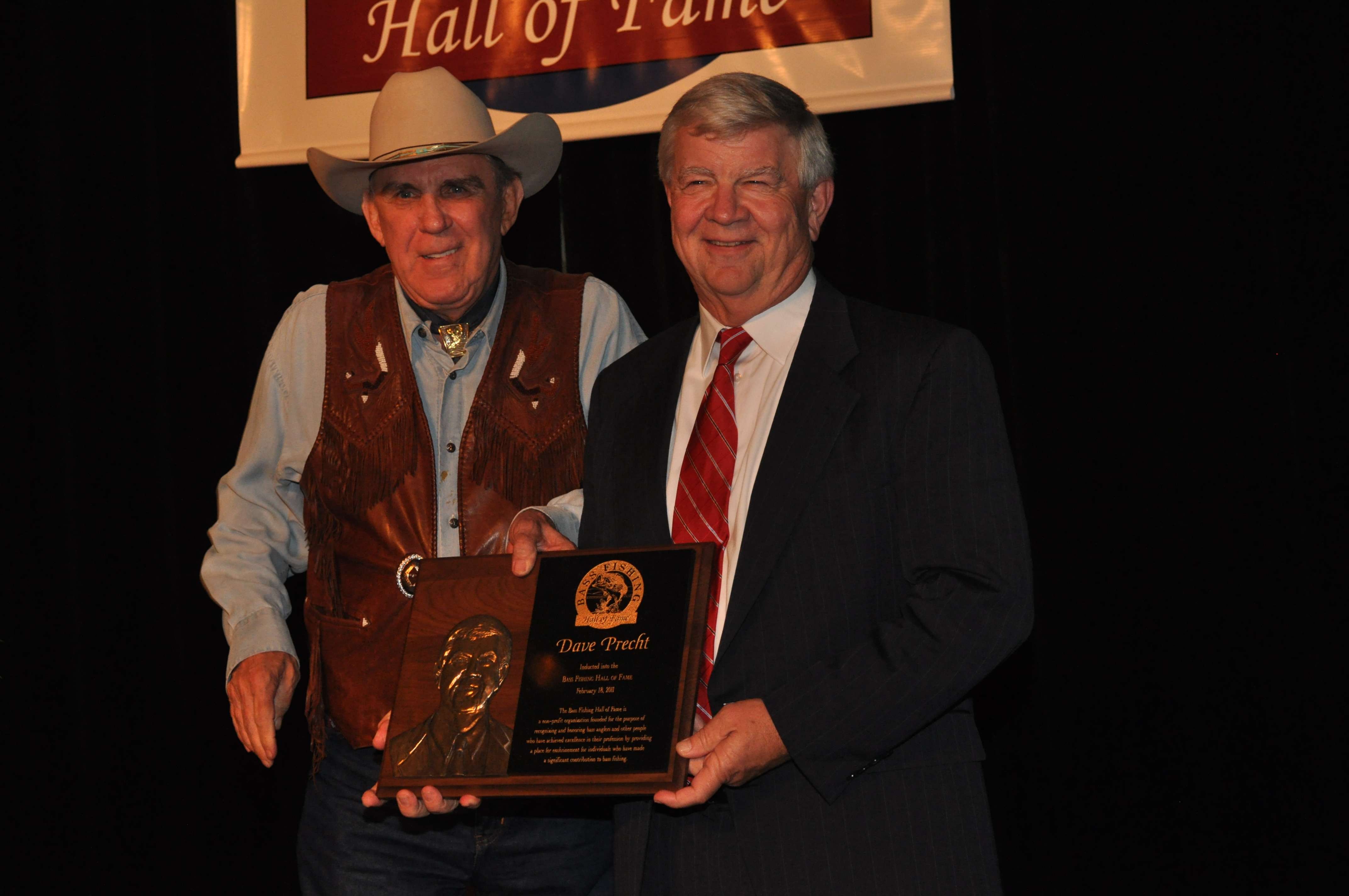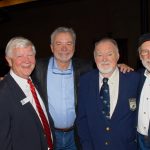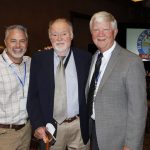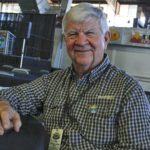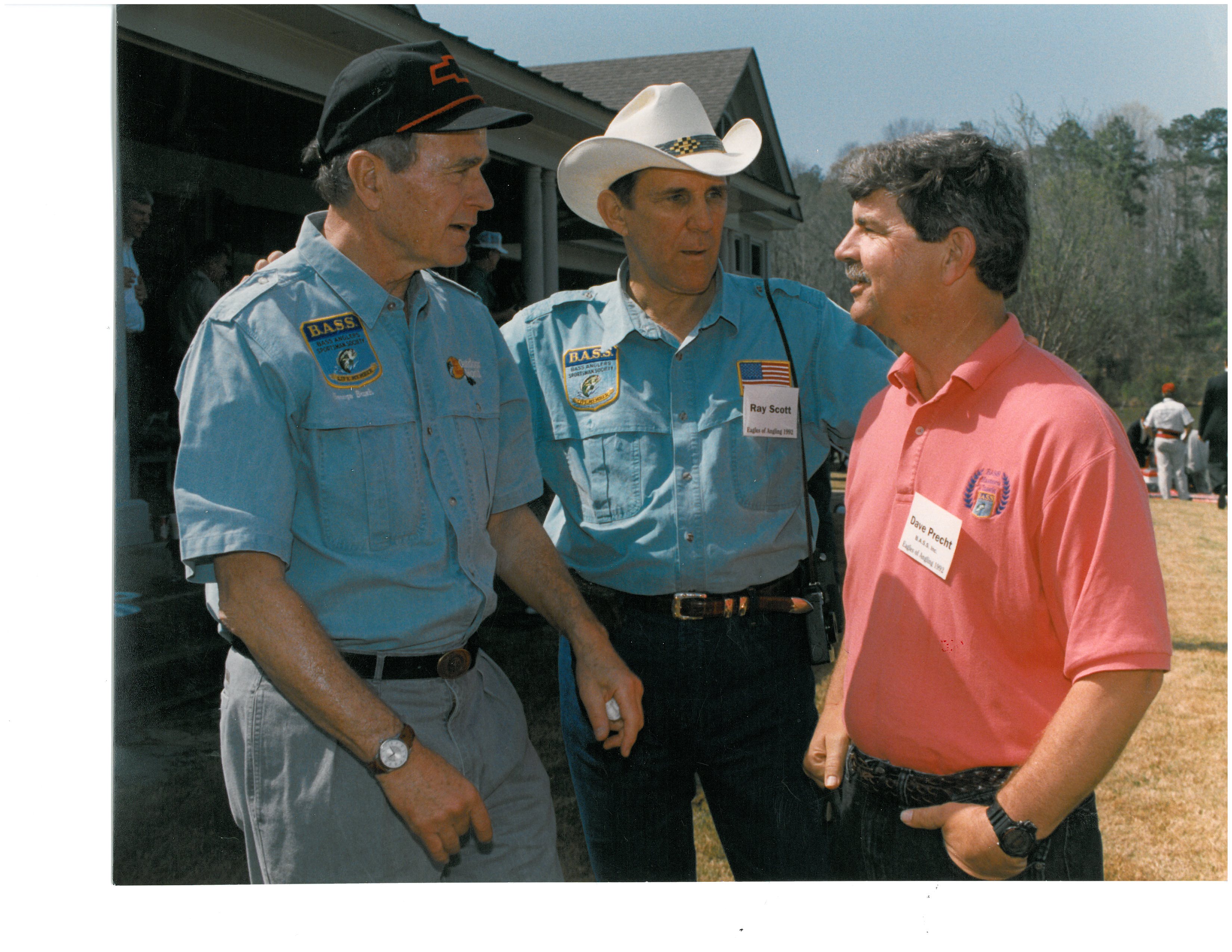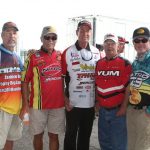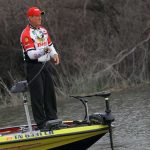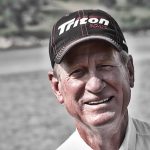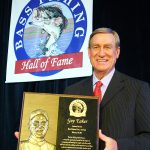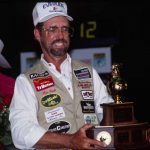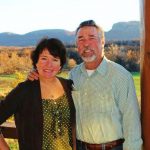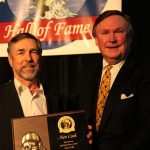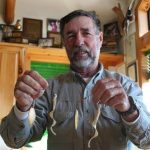John Powell
John Powell (1929 – 2007) – John Powell knew from a very early age what it meant to work hard. He grew up on what he called a “rawhide” farm in Elmore County, Alabama, just northeast of Montgomery. Like his father before him, he fished commercially in lakes and rivers along the Coosa and Tallapoosa rivers near his home.
Powell joined the Army Air Corps in 1947. In his 22-year service in the Air Force, he served in both the Korean War and the Vietnam War, rising to the rank of Chief Master Sergeant.
While still serving in the Air Force, Powell returned to his native Alabama and decided to check out the new tournament organization established in nearby Montgomery, the Bass Anglers Sportsman Society, by his longtime friend, B.A.S.S. founder Ray Scott.
Scott loaned Powell a V-hull plywood boat so he could fish the second Bassmaster tournament, the Dixie Invitational on Smith Lake, Alabama, in 1967. Scott secured a more seaworthy Chrysler boat for Powell to fish additional events, and he used it to post his first win, claiming the 1968 Eufaula National on Lake Eufaula, Alabama, with a stunning catch of 132 pounds.
Hooked on tournament fishing, Powell retired from military service in 1969 and began fishing professionally, becoming the first to win back-to-back tournaments, in 1971 on Sam Rayburn and Table Rock lakes. Powell qualified for six Bassmaster Classic championships.
Powell was one of the first members of B.A.S.S. and one of its early tournament trail stars. He shared the spotlight with men like Bill Dance and Tom Mann, and he was winning tournaments before Roland Martin arrived on the scene. He was frequently near the top of the standings, finishing in the Top 50 in more than half the 90 tournaments he fished, including 32 Top 20s and 16 finishes in the Top 10, counting his three victories.
Along with Martin, he was a popular speaker on the Bassmaster Seminar Circuit, on which they, along with Scott, Bob Cobb and Harold Sharp, toured the nation giving presentations on bass fishing to packed auditoriums in 101 cities over a two-year period. Powell believed he was the first pro angler at the beginning of B.A.S.S. to earn a sponsor contract.
He was an early innovator of shallow-water fishing with plastic worms, which were gaining popularity in the 1970s after Mann’s Bait Co. hit the market with the Jelly Worm. Powell regularly told anglers in the boat with him to set the hook quickly when they felt a bite instead of waiting. “That first tap you feel is the bass sucking in your worm,” he would tell his listeners. “The second tap is the fish spitting it out. The third tap is me tapping you on the shoulder to tell you that you missed him!”
John Powell
Irwin L. Jacobs (1941-2019) – Irwin Jacobs was a highly successful businessman in a variety of industries, but his passion for bass fishing was best embodied through his longtime leadership of the FLW Outdoors and ownership of Genmar Industries, the world’s largest privately-held recreational boat builder. He was inducted in to the Bass Fishing Hall of Fame in 2010.
Jacobs was raised in Minneapolis, very briefly attended the University of Minnesota, and literally embodied the American “rags to riches” story. At 8 years old, he started working for his father’s Northwestern Bag Company, collecting and reselling burlap sacks. In 1973, Jacobs founded COMB (“Close-out Merchandise Buyers”), a catalog-based mail-order retailer, and along with several cable television magnates he later created the Cable Value Network, an innovative shopping channel later purchased by QVC. Jacobs, based in Minneapolis, became wealthy by taking big stakes in Fortune 500, usually to unlock value by breaking them up thus earning the nickname “Irv the Liquidator.” He was a relentlessly bold and aggressive businessman, and many of his ventures were taken in collaboration with friend Carl Pohlad. Together they were involved in corporate acquisitions of the Grain Belt Brewery, Disney and Kaiser Steel. Along with Pohlad and others, Jacobs owned a portion of the Minnesota Vikings for a period of time.
Gemar, which included iconic bass boat brands like Ranger Boats, Stratos and Javelin, became a large player within Jacobs’ portfolio, and led him to purchase and operate FLW Outdoors, the world’s largest fishing tournament organization with annual awards of millions of dollars for anglers in tournament circuits targeting species including not just bass, but also walleye, redfish, kingfish and striped bass. Those circuits ranged from the tour-level down through the weekend angler. In the latter category, FLW owned the Red Man Tournament Trail (later renamed the BFL, or “Bass Fishing League”) and ultimately took on a portion of the Bass Federation.
His decision to purchase what until then had been known as Operation Bass was an attempt to fully tap into the buying power of the nation’s 50 million fishing enthusiasts. He later renamed the operations FLW Outdoors after the legendary founder of Ranger Boats, Forrest L. Wood. Jacobs saw FLW Outdoors tournaments as a unique and powerful opportunity to communicate with a huge consumer group that had never been pursued. In 1997, Jacobs hooked the giant retailer, Wal-Mart, as a title sponsor, which eventually allowed Jacobs to court the world’s leading consumer products companies. As a result of Jacobs’ efforts, more than 50 leading consumer brands, including brands owned by global powerhouses BP, General Motors, Kellogg’s, and Procter & Gamble, sponsored FLW Outdoors tournaments. In 2007, FLW Outdoors made history by awarding the sport’s first $1 million check to Arkansas angler Scott Suggs when he won the Forrest Wood Cup championship.
In addition to his accomplishments in sport of tournament fishing and the business world more broadly, Jacobs was a devoted and generous philanthropist. He underwrote and served as chairman of the 1991 International Summer Special Olympics Games, which were held in Minneapolis/St. Paul. Additionally, he personally funded the building, furnishing and overall operations of Dells Place, a group home for developmentally challenged individuals; Functional Industries, an occupational workshop for physically and mentally disabled individuals; and The Art Center of Minnesota. Additionally, Jacobs supported several other local and nonprofit organizations benefiting the arts, disabled, developmentally challenged and homeless.
- Irwin Jacobs presents Scott Suggs
Irwin Jacobs
Woo Daves — Near the end of his long career in professional fishing, Woo Daves won the 2000 Bassmaster Classic in Chicago. In all, he has competed in 17 Classics, finishing among the Top 5 in six of those events. He has won four Bassmaster tournaments, including the 2002 New York Open.
Daves is known as a relentless promoter of bass fishing, spending the entire year after his Classic win presenting seminars and making appearances to represent his sponsors and the sport.
One of the first to establish a close connection between NASCAR and bass fishing, Daves established an annual charity tournament involving NASCAR legends and bass anglers in 1991. The tournaments generate funds for Super Kids, a Virginia-based organization benefiting the mentally challenged.
Woo Daves
Dave Precht (1949- ) — When he retired from B.A.S.S. in July 2019, Dave Precht ended a lengthy career in his “dream job” — educating and entertaining bass anglers through the pages of Bassmaster Magazine. His 40 1/2 years with the company made him the longest-tenured employee of B.A.S.S., and that included 19 years as editor of Bassmaster and another 16 as editor in chief.
When he succeeded Bob Cobb at the helm of the magazine, it fulfilled the goal Precht had set in grade school, when he decided he wanted to be the editor of an outdoor magazine. And it happened almost by accident.
As the outdoor writer for the Houston Post newspaper, Precht was invited to cover the 1978 Bassmaster Classic at Ross Barnett Reservoir in Mississippi. After he missed the media bus back to the hotel following the final weigh-in, he hitched a ride with Ray Scott, founder of the then-young fishing organization. The two hit it off immediately, and Scott soon recruited Precht to join the B.A.S.S. operation in Montgomery, Alabama, and prepare to take over Bassmaster.
After eight years in the newspaper business, Precht and his wife, Linda, moved to Alabama, and he began work as staff writer for Bassmaster and publicist for the B.A.S.S. Tournament Trail. When he wasn’t attending bass tournaments, Precht worked as speech writer and public relations assistant for Scott, who had just been named the state chairman in Alabama for George H.W. Bush’s campaign for the presidency.
In 1980, Precht took over another B.A.S.S.-owned magazine, Southern Outdoors, a hunting and fishing magazine that covered the southeastern states.
He was moved to editor of Bassmaster in 1984, when Bob Cobb became producer/director of the new television show on The Nashville Network, “The Bassmasters.” He maintained the editorial format Cobb had established by using professional anglers as the main sources of how-to information. He also set about assembling a lineup of contributors who not only were gifted communicators but also passionate and skilled anglers. Bassmaster senior writers including Don Wirth, Steve Price, Tim Tucker, Louie Stout and Wade Bourne — all members of the Bass Fishing Hall of Fame — helped attract new B.A.S.S. members by the thousands.
He introduced those readers to mainstay features that are still read today, including “Day on the Lake,” “Lunker Club,” “Bassmaster Basics,” “Ask the Experts” and others. With the continued success of the magazine, frequency increased from eight issues per year to 11, and Bassmaster joined Field & Stream and Outdoor Life as the most popular outdoor magazines in the nation.
During his nearly 20 years as editor, Bassmaster grew to more than 600,000 members (subscribers), and the magazine was selected as one of the Top 10 “Hot Properties” among all magazines by Ad Age. As editor, Precht dedicated the magazine to promoting competitive fishing, boating safety, conservation, sportfishing ethics and bass fishing as family recreation.
Shortly after B.A.S.S. was acquired by ESPN, Precht was promoted to senior director of several departments, including editorial and conservation. After almost two decades of editing Bassmaster, he turned that job over to James Hall, who became the third editor of the magazine in its 50-plus-year history, in 2003.
As a member of the senior staff under ESPN and its successors — Don Logan, Jerry McKinnis and Jim Copeland, who bought B.A.S.S. in 2010 — he also edited B.A.S.S. Times Magazine from 2008 through 2015. He served as vice president, Editorial and Communications from 2011 until his retirement.
Precht also served on the Communications Committee of the American Sportfishing Association and the Board of Directors of the Bass Fishing Hall of Fame. Passionate about promoting youth fishing, Precht created the prestigious Bassmaster High School All-American Fishing Team program, which honors high school anglers who excel in fishing competitions, academics, leadership and community service. A 2011 inductee into the Bass Fishing Hall of Fame, Precht was named to the Legends of the Outdoors Hall of Fame in 2017 and the Fresh Water Fishing Hall of Fame in 2018.
- with Dave Precht, Steve Bowman and Bob Cobb
- There have only been three editors of Bassmaster Magazine. Precht, Bob Cobb and James Hall.
Dave Precht
Guy Eaker, Sr. — Guy Eaker, Sr. is still competitive in the B.A.S.S. OPEN and the Carolina’s Bass Challenge tournaments at the age of 77, proving that fishing is a sport for all ages. He began fishing at the age of four, when his father, Earl Eaker, took him on his first fishing trip. Guy went on tour as a Professional Angler in 1975, making him one of the senior members of the tournament circuit. In 1975 he won the N.C. ABF State tournament, granting him the right to fish in his first National tournament, the ABF Top 400 World Championship in Kissimmee, FL. Guy placed 19th in the championship, caught “big fish”, and won a new boat. Following these winnings, he won the ABF Lake Seminole tournament and won 1977 ABF “Angler of the Year”. In 1980 he won the Hungry Fisherman circuit “Angler of the Year” and in 1994 he won his first National BassMasters’ tournament on Lake Sam Rayburn in Texas.
Over the years, Guy has fished in 341 National tournaments, has placed 177 times in the money, and given over 700 seminars. He qualified for 10 BassMasters’ Classics, 4 ABF Grand Prix Classics, the 2009 PAA Classic, and the 2010 PAA All-star Qualifier. He has fished in over 20 celebrity tournaments, with professional golf and racing icons, Dale Earnhardt Sr., Harry Gant, Michael Waltrip, Payne Stewart, Fuzzy Zoeller, Hal Sutton, and Brad Bryant. He has fished with two former presidents, George Bush and George W Bush. Fishing with both Bush presidents raised over a million dollars to assist in building a church in Pintlala, AL , the home of founder and previous owner of B.A.S.S., Ray Scott. Guy has supported many charities throughout his fishing career. Such as, Special Olympics for Children, United Way of Carolinas, Muscular Dystrophy Association and St. Jude Children’s Research Hospital.
Guy has also enjoyed success as a lure designer, has produced many videos on how to fish for bass, and is coauthor, with Steve Price, of the book, Catching Bass Like A Pro. Guy has not only fished in many US fishing circuits, he has fished in other countries. He shot commercials for Abu Garcia in Sweden, fished in Canada and Mexico, and in 2002 he fished in and won Brazil’s first International Peacock tournament on the Amazon River. In 1978, he represented the USA in one of the first International tournaments in Cuba, where Castro welcomed them.
Eaker is a board member and a long-time supporter of the Bass Fishing Hall of Fame. He was inducted into the Cherryville (N.C.) Sports Hall of Fame in 2001, the Bass Fishermen Hall of Fame (BFHOF) 2011 and the Gaston Country Sports Hall of Fame in 2012. In recognition of his professional career and his civic contributions, his hometown of Cherryville, NC declared July 4, 1992 as “Guy Eaker Day.”
- With fellow Hall of Famers, Ken Cook, Tommy Martin, Bobby Murray and Rick Clunn
Guy Eaker
Ken Cook (1947—2016) In 1983, Ken Cook walked to a payphone across from the weigh-in stage in Palatka, Florida to phone his wife Tammy and tell her he’d just won $100,000 in the Super B.A.S.S. event, and would soon be quitting his job as a fisheries biologist.
It was a phone call that ultimately lead him to the Bass Fishing Hall of Fame.
Cook was an impressive blend of both academic intelligence and natural intuition. He was raised in rural Wilburton, Oklahoma and graduated with a B.S. degree in zoology from Oklahoma State University before beginning his 13-year career as fisheries biologist for the Oklahoma Department of Wildlife and Conservation.
He was proud of his work in fisheries, but an internal fire to combine his love of the bass fishing with competing in tournaments eventually lead to a pair of victories in much respected B.A.S.S. regional events prior to winning the $100,000 1983 Super B.A.S.S. events on the St. Johns River.
Cook’s phone call home from the St. Johns to declare a major career change became powerful igniter to what became an iconic 26 career as a pro angler, highlighted by his victory in the 1991 Bassmaster Classic on the Chesapeake Bay using the beloved Hart spinnerbait he helped design.
Prior to his Classic victory, Ken also won the 1983 Missouri Invitational on Truman Reservoir, and the 1987 New York Invitational on the St. Lawrence River.
He was truly one of the world’s greatest professional bass anglers during the decades of the 1980s and 90s, qualifying for 14 Bassmaster Classics during that era.
The 1991 Bassmaster Classic victory enabled him to buy hundreds of acres of land near Meers, OK, where they built a home in 1995 on what he and Tammy named Tarbone Ranch. The family passionately manages herds of whitetail deer, elk, and trophy bison for trophy hunting.
In 2005, Cook was selected by B.A.S.S. as one of the Top 35 angler of all time, and two years after he retired from professional bass fishing in 2009, he was inducted into the 2011 class of the Bass Fishing Hall of Fame.
He thoroughly enjoyed retirement by sharing quality time in the outdoors, not only on Tarbone Ranch with sons Jason, Hunter and Tanner and their families — but also with Tammy on extended excursions to places such as Door County, Wisconsin to chase smallmouth bass for weeks at a time, and Africa where he harvested perhaps his proudest archery trophy of all time – a leopard.
Ken was chopping wood and hunting coyotes on Tarbone Ranch hours prior to his unexpected death in January 2016 of an apparent heart attack at age 68.
Perhaps a fitting final chapter to a man whose life was guided by his own compass en route to achieving what many may have labeled nearly impossible dreams of becoming a legendary pro bass angler while working as a fisheries biologist.
- Ken with his wife Tammy
- Ken at his induction into the HOF
